1. What’s going on with Therion these days?
At the moment we're putting together a new band for the upcoming tours.
We have just found a new drummer and we're now searching for a new
soprano, as Sarah unfortunately won't be able to go with us. It's hard
Work finding the right people.
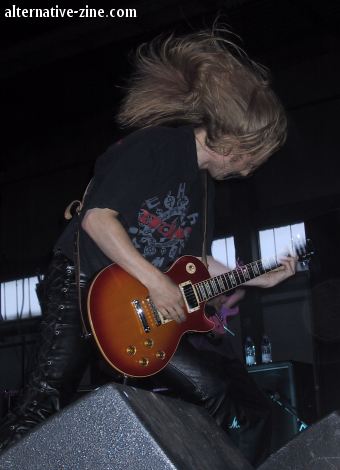 2. How different was the process of working on a new album now, When compared to when the band started out?
2. How different was the process of working on a new album now, When compared to when the band started out?
Oh... Well it's nothing at all in common basically. Back then we just
wrote a couple of songs and we rehearsed regularly all the time. When we
had enough songs for a record we just went in to the studio and recorded
the stuff. 4 guys performing drums, guitars, bass and vocals - nothing
complicated. Our first record took 6 days to record and mix - plus one
extra day to remix 6 of the songs.
Now we first write tons of songs. When we feel it is time and we have
the strength to record a new album we go though all the material and
choose some candidates that we present for the others. Then we make
pre-productions of these to get a clue of it and try to arrange the
stuff in different ways before choosing the songs for the records. Then
We make a preproduction (demo versions of all the songs) to have a sort
of map to follow during the recordings. At this point I also have to
make all the scores and notes for recording of orchestra and choir. For
this recording there were 171 (!) musicians and singers involved and it
took 9 months to record and mix it!
The last few albums we never rehearsed at all as a band before the
recordings, we would just learn all the parts individually and then
record it separately in the studio. But this album we actually
rehearsed about half of the songs a bit as a band before we entered the
studio.
3. Going back to those older days, I’d like to ask you a bit about how you started out, What was the first album you listened to, how did you find your way into heavy metal?
The first LP (besides those with stuff for children of course) was a
Beatles "Greatest Hits" album. I was 9 years old then. One year later I
heard Accept's song "Balls to the Wall" on the radio as the record
with the same name was released. This totally freaked me out and a
class mate who had Accept's "Restless and Wild" recorded it on tape for
me. On the other side he recorded Judas Priest's "Screaming for
Vengeance" and I was totally blown away! I later bought "Balls to the
wall" and Saxon's "Wheels of Steel" and then I was forever sold on this
type of music!
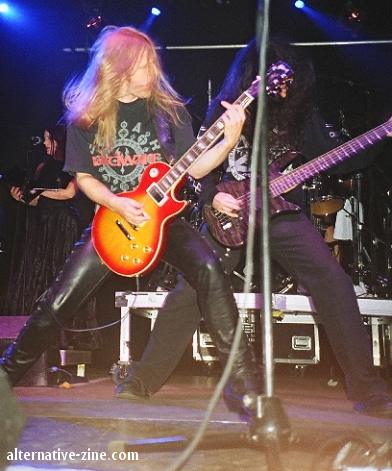 4. When did you start playing guitar?
4. When did you start playing guitar?
I started as a bassist when Therion was formed, but one year later
(1988) I switched to guitar. I started with the bass because there was
some guys jamming and they needed a bass player, that's how I got to
start playing in the first place. But then I felt guitar was more
suitable to compose on so I started to play more and more guitar and
lost the interest in playing bass after a while.
5. What was the one band you can pinpoint as driving you to be a professional musician?
I can't say one it must be both Accept and Judas Priest. When I
discovered these two bands I realized that what I wanted to do in life
was to become a "famous metal musician". It would take a couple of
years before I would start playing an instrument and realizing this
"plan" though.
6. Did you use to visit metal clubs outside of Sweden? At what age?, did you run into any known musicians?
No, I hardy visit metal clubs in the city where I live in Sweden. I'd
say I'm not very "rock n roll" privately and basically never go out to
pubs or clubs. Same when I was younger, I didn't even drink alcohol
before I was 20.
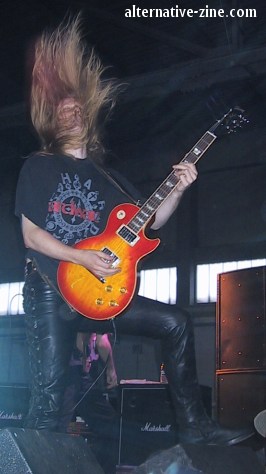 7. You were in a band prior to Therion, what was it called?
7. You were in a band prior to Therion, what was it called?
Well Therion was actually my first real band. I started playing with
this group of people jamming for some weeks (they didn't have a name
but sometimes joked about calling them selves Cracks Axe as a parody on
Anthrax). Then I tried to start up a band of my own with some people,
but even though I was a beginner my self, they sucked too bad and I
gave up on them. Our idea of a name was "Splendid" - which is quite far
from what we were to say the least, ha ha! Then I started to plan for
another band (which would later become Therion) and jammed with two of
the guys I had been jamming with before. For short while we thought of
the (ridiculous) name "Blazer", but when we had a full band put
together and the first few songs of our own I came up with the name
"Blitzkrieg". We used to play a cover of Metallica's cover version of
"Am I evil?", which was the B-side of the Creeping Death Maxi-single. As
we loved this maxi so much we took the name from the other cover song
there - Blitzkrieg, which was quite a suitable name as we back then were
a very noisy band (we sounded like a mixture between Venom, Motorhead
and very early Metallica).
8. Tell us about that band, how long did it last, and why did it come to an end?
Well, I later found out that there was already another band called
Blitzkrieg that had a record out, so I decided to change the name, which
would anyway had been suitable as we changed our sound toward death
metal. I came up with the name "Megatherion" that was taken from Celtic
Frosts album title To Mega Therion - I was at this time becoming a
totally fanatic Celtic Frost fan. However, we shortly after cut the
name down to just "Therion".
Therion is an ancient Greek word and simply means "beast". Esoterically it would be
the same as Belphegor that is the ruler of Thagirion - the mirror
(qliphotic) side of Thiphereth on the Tree of Life.
As we had done some local concerts with Blitzkrieg, we were known for
the previous sound (well, "known" in the Stockholm suburb we lived in,
ha ha) and as we planned to stop playing those songs if felt good to
change the name and give the impression that it was a new band. And in
retrospective I might also add that it was a name that easily could
have been misunderstood, so therefore it was good that we changed the
name also from that perspective (which we didn't think of back then of
course as the members in the band were only 14-15 years old). But
really, it was the same band as Therion, the same members would record
Therions two first albums and there were even some Blitzkrieg ideas
from the end (that we never played live) that survived and ended up in
a Therion song. Two of the riffs in "Morbid reality" from our first
album if I remember it correctly (after all it's 16 years ago).
9. Which bands influenced Therion’s style, and which bands Influence you these days?
The first year I would say it was Metallica and Slayer. Then It was
more or less only Celtic Frost for a while. On our second album there's
some Uli Jon Roth influences and that explains much of the first seeds
of the symphonic/classic influences being heard on it (though Celtic
Frost was also here the main influence also for the symphonic parts).
Later I would start getting influenced by the old heavy metal bands I
grew up with, I'd say Iron Maiden have over all been the biggest
influence one can hear in the songs, but also Accept and Judas priest.
I also started listening to symphonic rock bands and other stuff from
the 70's such as Pink Floyd's "Atom Heart Mother", Eloy, Klaatu,
Pavov's Dog etc. And Bands like Uriah Heep that I always had liked
started to influence me for guitar melodies, I love Mick Box's playing
style.
As we turned into an act mixing opera and classic music I must say that
Richard Wagner is my biggest influence. For a while there was also some
Stravinsky influences, but it was too hard to incorporate in metal.
Wagner's more bombastic sound fits into heavy metal music so much
better. Also it's easier to get inspired by opera that have dramatic
themes than the typical Italian opera love stories. But I also
know that the case with Wagner a sensitive topic and is splitting
classic music lover into two different categories in Israel - ones who
loves his music and who see only the musical genius Wagner and one
category who say they can't listen to his music "because he was an
anti-Semite". Well, besides the fact that I think art and politics
should not be mixed up, I might add that the anti-Semitism of Wagner is
greatly exaggerated, he worked with many Jewish people - conductors,
musicians etc. And I find it quite a hypocrisy that his music is banned
(!) in Israel - for example the really anti-Semitic composer Chopin is
very often played and appreciated in Israel and there are other similar
examples. There was once a poll made among people dedicated ti classic
music in Israel if the Israeli Symphony Orchestra should play Wagner or
not. Only 30% were against it, so it is sad that a minority should
dictate what the majority can listen to. I bow my head in honor to
Jewish people like Daniel Barenboim, Zubin Mehta and Mendi Rodan who
have had the courage to defy the forbid and who have had Wagner
performed in Israel - especially to Mendi Rodan who him self is a
holocaust survivor.
I think we have enough problems in the world already as it is without
polluting music with politics, so let's all enjoy the wonderful
language of music that everyone in the world can understand and enjoy
without any prejudice or hatred. If people can not love music - how can
they love each other?
Sorry for taking up space with this last part, but unfortunately it
seems to be necessary in these wicked days.
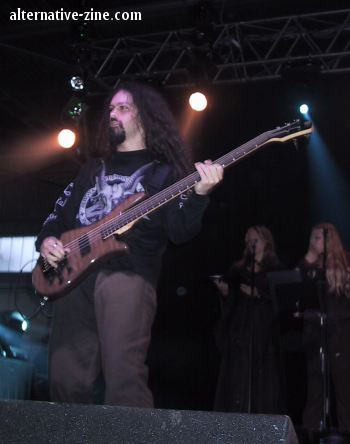 10. Can you specificity about the creative process being Therion’s music, how are the songs written and recorded?
10. Can you specificity about the creative process being Therion’s music, how are the songs written and recorded?
The basic ideas always comes spontaneous for me. Like somebody would be
singing it to me in my ear. Then I record it and save it until we think
it's time to make a new record. Then I go through all the songs and
ideas and often I get very surprises as I've forgotten most of the
songs. Like "Did I really write this?". That makes it very fresh and
inspirong to work with and I usually get tons of ideas for arrangements
and improvements. When I have the stuff together the way I want it I
make a pre-preproduction (some simple demos) and from these we choose
what songs should be on the actual album. after that we make proper
demos on the songs and give them the final touch in arrangements (the
other guys usually have some space to put in their personality in their
instrument parts as well). As for the new two albums, Kristian and
Johan also wrote some stuff and then they usually wrote the basics and
I orchestrated and wrote vocal and choral melodies to it (sometimes
based on ideas already existing in the material and sometimes totally
new). In any case, when we make the proper demos (the preproduction) I
also make all the classic scores/notes which usually takes me quite a
lot of time. These demos are like a map to how to record the real
album. When we're done we usually record the songs for album totally
separately - we normally never rehearse as a band. And usually we also
get some small ideas of improvements while recording, so the songs
always get polished until the end - sometimes even the smallest details
can make a huge impact on how the listener will receive the songs.
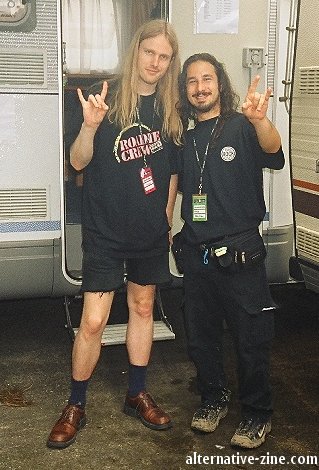 12. Can you tell us about the band’s progression from album to album, and the reasons for the massive changes in style and song writing?
12. Can you tell us about the band’s progression from album to album, and the reasons for the massive changes in style and song writing?
The reasons... that's a tough one. well, I guess I just wanted things
to sound in a certain way as I was progressing as a person (remember I
was only 15 when I started) and discovered new music to listen to. I
always wrote the kind of music I would have liked to listen to my self.
Each album is what I would have liked to buy my self. There have never
been any sort of plan or though behind the big changes over the years -
I just happened to write such songs spontaneously.
Of Darkness
This was a compilation of what we had achieved in 1988-89, recorded 1990
and finally released in 1991. From being beginners we had now learnt
how to play and also started to use some unorthodox extras to spice the
music with - such as small keyboard lines, untraditional guitar chords
and drum rhythms that were far from what you'd expect in death metal.
Political lyrics about the environment and similar.
The album was done in 6 days and we had a 500 Euro budget.
Beyond Sanctorum
Here we started to use clean male voices, female vocals, bigger use of
keyboards and we also started to experiment with Persian scales and
other things that was considered rather unorthodox for a death metal
band.
Occult philosophical lyrics (here I had discovered my self that politics
and art should not join).
10 days recording and 2.400 Euro budget.
Symphony Masses
Here you can hear the first pure classic influences as well as some
80's heavy metal riffing. Back then we were regarded as completely
nuts! I also experimented wildly with Persian and Arabic musical
influences as well as industrial and (hat would later be classified as)
Gothic styles. Some ceremonial performances as well, which was a result
of the lyrics becoming more advanced.
14 days recording and 2.600 Euro budget.
Lepaca Kliffoth
We hired a bass-barryton and a soprano and the step toward the
classic/opera influenced Therion people know today got much bigger with
this album. I started to vary my voice more and get away from the death
metal grunting by putting a bit of tone and melody to it and even
though I think it was fine for what we were doing on this album, I
realized that to be able to go on further I needed to stop being the
main vocalist in the band. Classic scales dancing with Persian scales
and we used sometimes guitar chords that were pretty complex (just a
pity the production isn't giving such things justice).
One month recording and 9.000 Euro budget.
Theli
North German Radio Choir, the drummer Piotr, Dan Swanö and a rock choir
called The Siren Choir took care of most of the vocals and the music
scene in Europe was very puzzled by Theli. We had 29.000 Euro and
one and a half month in the studio, so many songs I had written but
never thought I could have realized finally came true on this record.
Orchestra was still done by samples, but now there was suddenly a real
classical ambition in the game as well.
A'arab Zaraq Lucid Dreaming
10 year anniversary album that besides covers and unreleased material
contained my soundtrack to an art film. Developed my skills for
composing in the classic direction.
Vovin
Our best seller (150.000 copies - most of it in Europe). Here we used
for the first time a real string orchestra and a hand picked opera
choir. Classic intros to some of the songs showed my process of
learning this area. I also found out how great Hammond organ can be in
modern music. I had stopped singing my self completely and the record
was recorded completely with me + hired session musicians (so it's
basically my solo album). Here I had been working more with developing
the melodies and I guess that helped the sales.
1 months recording with a 40.000 Euro budget.
Crowning of Atlantis
Again covers and unreleased material + some live tracks. I wouldn't say
there's any development or progression here, besides the title track
that was a preview of what would be coming next.
Deggial
And next would be a focus on orchestral developments, discovering of new
instruments, such as horn, flute, trumpet, fluegelhorn, tuba, oboe and
more. The vocal arrangements got less "in your face" and the songs
structure and arrangement puzzled people again - this time in a way
that we begun to loose sales. Therion beacame a band for "thinking"
metal heads and people who normally would prefer classic music or old
progressive/symphonic rock. A real line-up was existent and Therion was
now a band again.
Two and a half month in the studio and a 45.000 Euro budget.
Secret of The Runes
Our first concept album, it dealt with the Nine Worlds in the ancient
Nordic mythology. Musically it mixed nordic folk music with Wagnerian
opera. Here I reached a point in composing that allowed me to start
writing on my first opera (which I hope will be finished in a couple
of years). The production was heavier and the guitars made the band
return to being more metal again I guess. New instruments were used
again, among others; Wagner tuba, Trombone, alt flute, piccolo flute
and English horn.
I find especially the choral arrangements very much progressed and for
the high peaks that comes once in a while I had employed a coloratura
soprano.
The opera soloists melodies were also very much developed and
especially the solo soprano was more than brilliantly performed by miss
Marika Schönberg (no no, she is not a relative of Arnold Schönberg - I
asked her, ha ha).
Again about 2 and a half months in the studio and over 50.000 Euro
spent. And again too complex for the masses and dropping sales compared
to the more commercial "Vovin" 3 years earlier. Nevertheless usually
the fave album from most of our die hard fans.
Live in Midgard
15 years anniversary and finally we got to know how hard it is to
record a live album (and I can hereby announce that it's fucking hard)!
We're still happy with the results. It's a REAL live album and not one
of those 90% overdubs crap albums that is so common nowadays.
13. You seemed to have been heavily influenced by the Jewish Qabbala and its writings, how did you come to know of it, and what is your relation to it and the Jewish religion to it is connected?
Well, the influence of qabbalah on the western occultism is indeed very
great and being devoted to such teachings, the qabbalah have naturally
had a great influence on me both personally and in the lyrics of
Therion. We for example have two record titles in Hebrew - "Theli" and
"Lepaca Kliffoth" (Swedish spelling - the English would be "qliphoth")
that relates to this and there are several lyrics that related to
I got in contact with the qabalah through Dragon Rouge which is an
occult order I belong to. DR studies all sorts of traditions and
methods, but qabalah was initially one of the strongest influences.
Later also ronology and rune magic started to take more and more space
and it's interesting how DR now is the only society in the world who
try to enliven the tradition of "gothic qabbala" - a qabala based on
runes, introduced and defined by Johannes Bureus in the 18:th Century.
A fascinating way to link our Nordic mysticism and roots with the
Jewish mysticism and its numerology's Hellenic roots! For those who
think runes were only an alphapet to write with, this idea might sound
weird, but when knowing the inner dimensions of the letters (just like
the Hebrew alphapet is so much more than just letter to write with),
there is a totally stunning logic in this
As for the Jewish religion, it is important to state that I am not at
all religious my self and the qabalah that have got incorporated with
the western occultism is a hermetic qabbalah that is not religious
either. Therefore the rules concerning for example that a person
working with qabalah should be 40 years old before he can start is not
an issue. The Hermetic Qabbalah
As this is for an Israeli zine I suppose that you are all mostly aware
of the of Jewish Kabbalah, but less with the hermetic Qabalah. There is
also a Christian version and one can see the difference in how it's
spelled:
Kabbalah - Jewish (tied to the Jewish religion)
Qabbalah - hermetic (an occult system based on the terminology and
Basic structures of the Jewish kabbala)
Cabbala - Christian
What makes the qabbalah so great to work with is the great way of
mapping the Existence (the Universe plus all astral, mental and
spiritual levels), the Tree of Life (and its qliphitic mirror side) is
a map how to obtain knowledge and spiritual development. Humans are
stupid - we need names on things in order to understand it and sort it
in our mental catalogue in the brain. The qabalah have solved this
brilliantly and therefore it is so much easier to learn this way than
via for example runes, that build more on the wordless knowledge
(perhaps that's why the Gothic Qabalah is such a perfect mix).
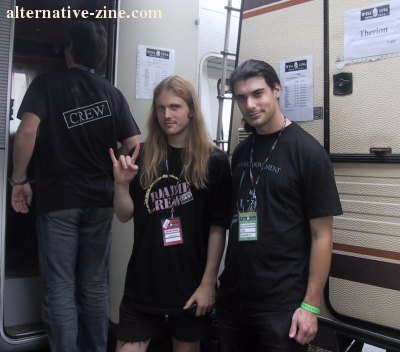 14. What cover songs do you perform at your live shows, and what songs did you cover for studio albums?
14. What cover songs do you perform at your live shows, and what songs did you cover for studio albums?
We have made many covers in the past, on our own records and tribute
albums we have covered a variety of bands and artists like Iron Maiden,
Scorpions, ABBA (!), Metallica, Carl Orff, Loudness, Manowar, Judas
Priest, Accept, Thin Lizzy and more.
Live we have played Saxon, Iron Maiden, Judas Priest and many more. For
future shows we have planned to play maybe some stuff that would
surprise the audience, like WASP or Motorhead, that would be cool.
When we play covers live it is always something that everybody in the
band enjoys, something we play just because we enjoy it our selves and
want to introduce to the crowd (can you believe that many fans never
heard of Accepts "Balls to the wall" before???). The covers we have
recorded on albums (besides the tributes) have been tracks that we
thought we could do something special with, kind of "therionize" them.
I guess there's loads of metal people who hate ABBA, but who still can
enjoy our version of "Summer night city"!
15. Can you tell us specifically about the new album, the creative forces participating in it, and its recording process?
First of all, it's actually 2 albums. We had 55 songs to choose from so
we decided to make 3 records out of it - two now and one will be done
later.
We used 9 months, over 100.000 Euro, 1500 pages of scores/notes and 171
musicians and singers to bring these two twins to life! Real church
organ, balalaikas, domras, mellotrone, real harpsichord, timpanis, 5
stringed double basses, bass and alt trombones, mandolins and even
more new instruments was both a kick and a real challenge to record!
Guitarist Kristian and bass player Johan have started to contribute to
the songwriting and I have also developed all my skills (classic as
well as melodies), so it's quite a fascinating mix of things that I
hope will please both those who have preferred the more complex
compositions on the latest albums as well as the masses who bought
Vovin. Here we also shocked our selves by actually rehearsing some of
the songs together as a band (the first time since 1995). How knows,
maybe this will be a new habit! I also shocked my band mates by making
some vocals my self on two of the tracks!
The recordings of the new albums was made in three different studios.
Drums, bass, guitars, almost all solo vocals, balalaikas and mandolins
were recorded at our own studio. Then we recorded orchestra, choir and
some of the opera soloist singers in Prague at a huge studio which
normally record orchestra for movies. Then we went to Denmark where we
recorded the final parts, first church organ (in Copenhagen oldest
church) with mobile equipment. Then Hammond organ and mellotrone at Sun
Studios were we also mixed the album.





